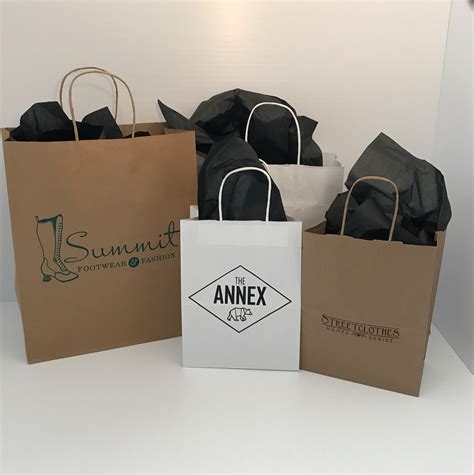The use of custom shopping bags has become increasingly popular among businesses and consumers alike, driven by the need for sustainable and eco-friendly packaging solutions. As the world grapples with the challenges of plastic waste and environmental pollution, custom shopping bags made from recyclable and biodegradable materials have emerged as a viable alternative to traditional plastic bags. In this article, we will explore the benefits and advantages of custom shopping bags, their types, and the factors to consider when choosing the right custom shopping bag for your business.
Key Points
- Custom shopping bags offer a sustainable and eco-friendly alternative to traditional plastic bags
- They can be made from a variety of materials, including cotton, jute, and recycled paper
- Custom shopping bags can be designed to reflect a company's brand identity and values
- They can help reduce waste and minimize the environmental impact of packaging
- Custom shopping bags can be a cost-effective solution for businesses looking to reduce their packaging costs
Benefits of Custom Shopping Bags

Custom shopping bags offer a range of benefits for businesses and consumers. One of the primary advantages of custom shopping bags is their sustainability. Made from recyclable and biodegradable materials, custom shopping bags can help reduce waste and minimize the environmental impact of packaging. Additionally, custom shopping bags can be designed to reflect a company’s brand identity and values, making them a powerful marketing tool. By using custom shopping bags, businesses can demonstrate their commitment to sustainability and social responsibility, which can help build trust and loyalty with customers.
Types of Custom Shopping Bags
There are several types of custom shopping bags available, each with its own unique characteristics and advantages. Some of the most common types of custom shopping bags include:
- Cotton bags: Made from natural cotton fibers, these bags are biodegradable and can be reused multiple times.
- Jute bags: Made from jute fibers, these bags are strong, durable, and can be used for heavy loads.
- Recycled paper bags: Made from recycled paper products, these bags are biodegradable and can be composted at the end of their life cycle.
- Non-woven bags: Made from non-woven polypropylene, these bags are lightweight, durable, and can be reused multiple times.
| Material | Benefits | Drawbacks |
|---|---|---|
| Cotton | Biodegradable, reusable, and durable | May shrink or lose shape after washing |
| Jute | Strong, durable, and can be used for heavy loads | May have a rough texture and can be prone to mold |
| Recycled paper | Biodegradable, compostable, and made from recycled materials | May not be as durable as other materials and can be prone to tearing |
| Non-woven polypropylene | Lightweight, durable, and can be reused multiple times | May not be biodegradable and can contribute to microplastic pollution |

Designing Custom Shopping Bags

Designing custom shopping bags requires careful consideration of several factors, including the material, size, and design. The design of the bag should reflect the company’s brand identity and values, while also being functional and durable. Some of the key factors to consider when designing custom shopping bags include:
- Material: Choose a material that is sustainable, durable, and suitable for the intended use.
- Size: Choose a size that is suitable for the products being sold and can be easily carried by customers.
- Design: Choose a design that reflects the company’s brand identity and values, while also being functional and durable.
- Color: Choose a color that is consistent with the company’s brand identity and values.
- Handles: Choose handles that are durable and comfortable to use.
Factors to Consider When Choosing Custom Shopping Bags
When choosing custom shopping bags, there are several factors to consider, including the material, size, design, and cost. Some of the key factors to consider include:
- Sustainability: Choose a bag that is made from sustainable materials and can be reused multiple times.
- Durability: Choose a bag that is durable and can withstand heavy loads.
- Cost: Choose a bag that is cost-effective and suitable for the intended use.
- Brand identity: Choose a bag that reflects the company’s brand identity and values.
- Customer experience: Choose a bag that is functional, durable, and enhances customer experience.
What are the benefits of using custom shopping bags?
+Custom shopping bags offer a range of benefits, including sustainability, durability, and brand promotion. They can help reduce waste, promote the company's brand identity, and enhance customer experience.
What types of materials are used to make custom shopping bags?
+Custom shopping bags can be made from a variety of materials, including cotton, jute, recycled paper, and non-woven polypropylene. The choice of material depends on the intended use, sustainability, and durability.
How can I design custom shopping bags for my business?
+Designing custom shopping bags requires careful consideration of several factors, including the material, size, design, and color. It's essential to choose a design that reflects the company's brand identity and values, while also being functional and durable.
In conclusion, custom shopping bags offer a sustainable and eco-friendly alternative to traditional plastic bags. By choosing the right material, size, and design, businesses can promote their brand, reduce waste, and enhance customer experience. As consumers become increasingly environmentally conscious, the demand for custom shopping bags is likely to grow, making them a vital component of any business’s packaging strategy.
